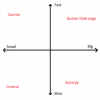I see a lot of information about small games around the forums, which I do enjoy, but wanted to talk about big games for a few reasons:
1. They correspond to my format (multiplayer FFA cube)
2. They tend to favor synergy driven environments
Synergies are usually about assembling pieces of an engine on board or in hand. So naturally, seeing more cards or having more mana let's you get the right combinations more easily.
In this example, he is talking about ramp decks, but I think that the same is true of synergy decks, except that instead of casting expensive spells, they are amassing and deploying engine pieces.
Either way, the take away here is:
Less interaction -> more game objects available -> bigger games.
Expensive cards or synergies take over a game in case of a stall.
Evasion and
Overrun effects are key to ending games.
Expensive cards or mana sinks win games.
So putting it all together (with a bit of my opinion):
1. Expensive cards can be exciting, but they are pretty narrow due to the fact that they are unusable a good portion of the game (my opinion, not in the article!)
2. In the article, it's stated that expensive cards or synergies can break a stall. Likewise expensive cards or mana sinks tend to win high ressource games. So if synergy and mana sinks can advance and finish games, the need for expensive cards diminishes hard.
3. Provide evasion or overrun effects as ways to avoid stalls (in my mind, these cards also diminish the need for expensive cards).
4. Limiting interaction allows boards to develop, which leads to bigger games, which tend to allow synergies to shine.
I think a good example of not needing expensive cards to finish games are Caleb Gannon's
Powered Synergy Cube. The curve is low, but seeing videos the game didn't struggle to end.

